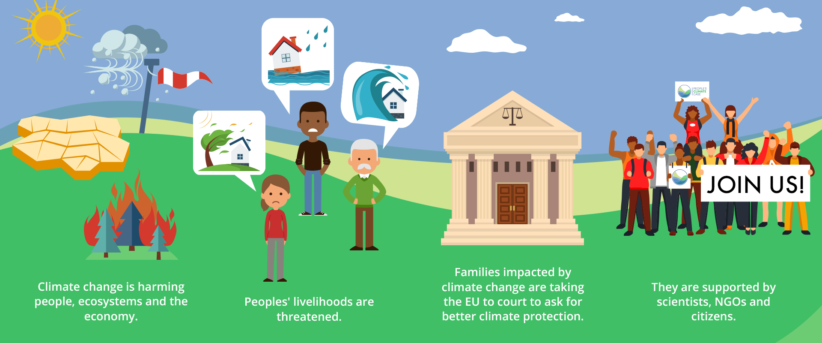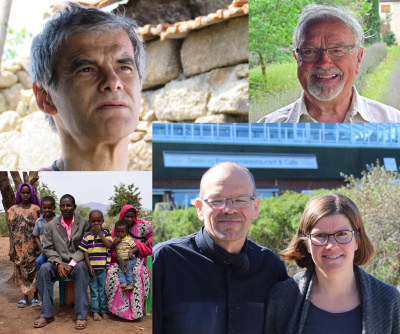- About
- Topics
- Picks
- Audio
- Story
- In-Depth
- Opinion
- News
- Donate
-
Signup for our newsletterOur Editors' Best Picks.Send
Read, Debate: Engage.
For the first time, people affected by climate change take legal action before the Court of Justice of the European Union (EU) for the protection of their fundamental rights
As part of its October 2014 decision on climate and energy policy, the EU seeks to cut greenhouse gas (GHG) emissions between 2020-2030 by at least 40 percent compared to 1990. This means that 60% of greenhouse gases from the 1990 levels will still be emitted in 2030 - with devastating consequences for humans and the environment. The Paris Agreement on climate change ratified by the EU in October 2016 requires a substantially more ambitious pathway to GHG reduction. Regardless, until now, the EU has adhered to its GHG reduction target of only 40 percent for the 2020-2030 period, and is pursuing its implementation.
Families from several European countries, but also from Kenya and Fiji, as well as a Sami youth organization from Sweden, accuse the European legislator of hurting their fundamental rights to life, health, occupational freedom, and property through an under-ambitious climate policy.
The plaintiffs, who are part of the so-called People's Climate Case, represent different focal points of climate change and already feel its effects today. For example, for the plaintiff families from Fiji and Germany, property and professional advancement are affected by sea level rise and storm floods. Plaintiff families from Southern France, Portugal, and Kenya see their lives endangered due to climate change-related heat waves and droughts culminating in forest fires and desertification. The plaintiffs from the Italian Alps are affected in their professional advancement through the withdrawal of ice and snow as well as the changed temperature and precipitation development. Finally, the Sami youth organization in Sweden has observed the adverse effects of warmer winters and summers on the traditional reindeer herding, threatening their cultural heritage.

According to the plaintiffs, the European GHG reduction path violates numerous rights etched in international laws. Fundamental rights to health, trade, and property protection are violated by the uneven initial impact of GHG emissions, with people in countries of the global South being most dramatically affected, and where children are deprived of their future life chances.
This implies an EU obligation to drastically reduce GHG emissions. Decisive here is the technical and economic feasibility. All sources of emissions - from transport and buildings up to heavy industry and agriculture - must be checked for their reduction potential. This has been failed by the European legislator. Had the European legislator made such an examination, they would have come to the conclusion that a reduction of GHG emissions by 2030 by more than 40 percent, namely by up to 60 percent, is feasible. Therefore, the plaintiffs make two requests: 1. the current legal actions should be annulled insofar as they set the reduction target at only 40 percent instead of 50 to 60 percent, but remain in force until the rectification will be done. For this the court should set a deadline. 2: The EU should be sentenced to not further harm the plaintiffs through additional emissions which exceed the unavoidable level; 50 to 60 percent of the 1990 emissions are estimated to be avoidable by 2030.
The plaintiffs are supported by environmental organizations, including CAN-Europe and Germanwatch, lawyers, and scientists who are convinced that the EU can and must be more ambitious in its climate goals. To ensure that the plaintiffs would not be held back from a lawsuit due to financial burdens, the German NGO Protect the Planet covers all costs of the legal proceedings. The lawsuit was delivered to the defendants in early August, who now have two months to respond.
"The courts of the Union are called upon to make it clear that climate protection is not only a political, but also a legal obligation," says Professor Gerd Winter from the University of Bremen (Germany), who together with the lawyers Roda Verheyen from Hamburg (Germany) and Hugo Leith from London (Great Britain) represents the plaintiffs in court.
The lawsuit is undoubtedly facing a number of challenges, resulting from the previous restrictive jurisprudence and legal practice. But even if the lawsuit should be dismissed, it will help to make these voices heard in the general public.
More information and a short movie with the plaintiff families can be found at: www.peoplesclimatecase.de
Images: People's Climate Case
Article translated by Marit Hauschildt
If you would like to support the families' and youth organization's concerns, donate to Germanwatch, Keyword "EU climate situation":
Bank for Social Economy eG
IBAN: DE 33 1002 0500 0003 2123 00
BIC: BFSWDE33BER
